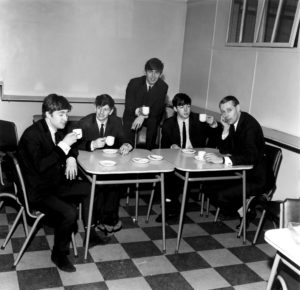
We mark the birth on January 3, 1926 – 96 years ago today – of the English record producer, arranger, conductor, composer, audio engineer, and musician Sir George Martin, the putative “Fifth Beatle.” Martin produced 13 albums and 22 singles for the Beatles between 1962 and 1970. All told, it’s a body of work that adds up to less than 10 hours of music. But here’s a case where numbers do not tell the story, because thanks to George Martin, those 9 hours-plus of recorded music revolutionized the world of popular music.
Today’s post will observe just how George Martin became the Beatles’ record producer. Tomorrow’s Dr. Bob Prescribes post will explore the impact Martin had on the Beatles’ recordings and what is, in my humble opinion, his masterwork: the Love album of 2006.
But first: a dinner conversation that I believe you will find most interesting.
What Makes a Song “Last”?
My neighbor across the street is a big, smart, outspoken man named John McGleenan.
I love John.
He came to the United States from Dublin, Ireland, in 1992 at the age of 24, here to make his fame and fortune. He has done both. He founded One Union Recording Studios in San Francisco in 1994 and has created nothing short of an empire, one that serves the movie, television, popular music, and advertising industries at the highest levels.
(You can check out John and One Union Studios)
John is a good friend of my great friend, Sandy Wilson, the cellist of the Alexander String Quartet. Some three or four or five years ago (there’s nothing worse than a historian who has lost track of time; suffice it that it was before the freaking pandemic), John, Sandy, and I (and a few others) were having dinner together at John’s house. We got into a discussion as to what classic pop/rock songs would “last”: what songs would still be performed 50 years from now. Everybody had an opinion; I sat back and listened.
When the time came for me to contribute my 2 pfennigs, I decided – as is my irksome wont – to reframe the conversation. I rhetorically asked, “what attribute or attributes makes any body of music ‘lasting?’” I then answered my own question. A song (or symphony or string quartet, etc.) “lasts” if it can be performed and reinterpreted by musicians other than its creator(s). What this means in terms of popular song is that in order to last, a particular song must have, musically, a high enough melodic profile and an interesting enough harmonic underpinning to be covered – performed – in a variety of settings and contexts. For example, the songs of the Great American Songbook.
To those dinner companions who had been extolling the timeless nature of the music of the Rolling Stones, I asked: have you ever heard a “satisfactory” cover of Satisfaction? The uniform answer was “no”, because Satisfaction – and, indeed, the great body of the Stones’ music – is, from a purely musical point of view, rather poverty stricken. It is the unique sound and personality of the Rolling Stones themselves that sells their music and not the music alone.
So: based upon my criteria – can a song be convincingly performed by someone other than its creator – will Satisfaction “last” beyond its original recording? No. How about Carol King’s You’ve Got a Friend (1971)? You’ve got a yes. Jimi Hendrix’ Purple Haze (1967)? Nope. Joni Mitchell’s The Circle Game (1967)? Yup. Steppenwolf’s Born to Be Wild (1968)? Nix. Bob Dylan’s Blowin’ in the Wind (1962)? But of course. Led Zeppelin’s A Whole Lotta Love (1969)? No way. Stephen Sondheim’s Send in the Clowns (from A Little Night Music, 1973)? You betcha.
We see a trend emerging here. Very generally (but not inaccurately) speaking, the songs created by and for hard rockers are characterized, one, principally by their beat and, two, by the musical personalities of the rockers themselves and not by their melodic and harmonic content. Whereas the songs of folk, folk-rock, pop, and theater composers are, by their nature, driven by their melodies and harmonies.
Back, finally, to our little dinner get together. This is where I finally volunteered my opinion that if we really want to identify rock ‘n’ rollers who created a body of songs that will “last”, we need look no further than the Beatles, whose mature songs owed more to the traditions of folk-pop and the English music hall than to hard rock.
A general uproar ensued. Okay, it only came from one person – our host – but John is big enough and loud enough to create a “general” uproar all by himself.
“George Martin!”, he howled. “It was all [their producer] George Martin!”…
Continue reading, only on Patreon.
Become a Patron!Listen on the Music History Monday Podcast
Podcast: Play in new window
Subscribe: Apple Podcasts | Spotify | Pandora | iHeartRadio | RSS | More
